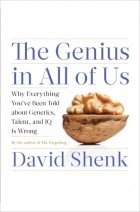The Genius in All of Us: Why Everything You’ve Been Told About Genetics, Talent, and IQ Is Wrong
July 8, 2010
- author |
- David Shenk
- year published |
- 2010
 Amazon | In The Genius in All of Us, Shenk beautifully explains why the nature-nurture debate is dead. It is not just the genes we are born with, but how we are raised and what opportunities are open to us that determine how smart we will become. Nurture and experience reshape our genes, and thus our brain. Shenk argues that the idea we are either born with genius or talent, or we aren’t, is simply untrue. The notion that relentless, deliberate practice changes the brain and thus our abilities has been undervalued over the past 30 years in favor of the concept of “innate giftedness.” Practice, practice, practice (some say 10,000 hours or more) is what it takes. Shenk argues that it is just some fantasy that effortless, gifted genius is born and not made. He marshals evidence to show that genetic factors do not trump environmental factors but rather work in concert with them. Shenk notes that by the sweat of our brow we can train ourselves to be successful–even if we are born with only average genetic talent. Scientists know that how we are raised and how we are trained affects the expression of our genes. If you think you’ve reached your talent limit, think again, Shenk says. It’s not just in your genes, he says, but in the intensity of your motivation. Ambition, persistence, and self-discipline are not just products of genes, but can be shaped by nurture and environment. Certainly it is important to have good genes, but that determines at most only 50 percent of your talent. He underscores the point that intelligence is made up of the skills that a person has developed–with an emphasis on “developed”–through hard work. Encouraging ourselves and our children to work hard requires being surrounded by others also wanting to achieve striving for excellence. Moreover, Shenk gives the hopeful message not just for kids, but also for adults. Happily for us, the human brain remains plastic, changeable and trainable well into old age. So no matter how old you are, if you’d like to be smarter–get to work! –Louann Brizendine
Amazon | In The Genius in All of Us, Shenk beautifully explains why the nature-nurture debate is dead. It is not just the genes we are born with, but how we are raised and what opportunities are open to us that determine how smart we will become. Nurture and experience reshape our genes, and thus our brain. Shenk argues that the idea we are either born with genius or talent, or we aren’t, is simply untrue. The notion that relentless, deliberate practice changes the brain and thus our abilities has been undervalued over the past 30 years in favor of the concept of “innate giftedness.” Practice, practice, practice (some say 10,000 hours or more) is what it takes. Shenk argues that it is just some fantasy that effortless, gifted genius is born and not made. He marshals evidence to show that genetic factors do not trump environmental factors but rather work in concert with them. Shenk notes that by the sweat of our brow we can train ourselves to be successful–even if we are born with only average genetic talent. Scientists know that how we are raised and how we are trained affects the expression of our genes. If you think you’ve reached your talent limit, think again, Shenk says. It’s not just in your genes, he says, but in the intensity of your motivation. Ambition, persistence, and self-discipline are not just products of genes, but can be shaped by nurture and environment. Certainly it is important to have good genes, but that determines at most only 50 percent of your talent. He underscores the point that intelligence is made up of the skills that a person has developed–with an emphasis on “developed”–through hard work. Encouraging ourselves and our children to work hard requires being surrounded by others also wanting to achieve striving for excellence. Moreover, Shenk gives the hopeful message not just for kids, but also for adults. Happily for us, the human brain remains plastic, changeable and trainable well into old age. So no matter how old you are, if you’d like to be smarter–get to work! –Louann Brizendine